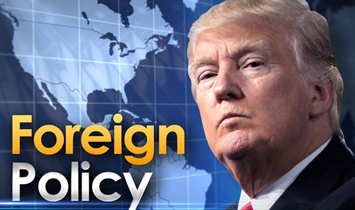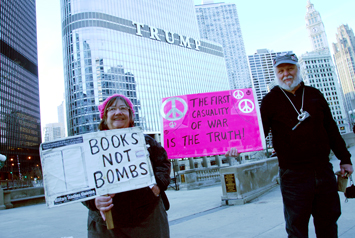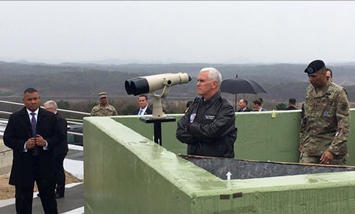Trump military moves
By Askia Muhammad -Senior Editor- | Last updated: Apr 19, 2017 - 9:31:19 AMWhat's your opinion on this article?

Protesters march during a rally against the U.S. missile strikes in Syria, April 7, in New York. The U.S. fired a barrage of cruise missiles into Syria on April 4 in retaliation for a chemical weapons attack against civilians earlier in the week. Photo: AP/ Wide World photos
|
Changes in policy and public approval ratings
WASHINGTON—At the cost of betraying practically every promise “candidate Donald J. Trump” made, “President Donald J. Trump” has resorted to a time-proven trick for instant popularity: he launched a couple of unprovoked military attacks, and his approval ratings have increased appreciably.

|
Nail-biting confrontations with Russian ally Syria, and Chinese ally North Korea have taken the spotlight away from the administration’s failures on “Obamacare repeal-and-replace,” and the immigration ban on travel from six predominantly Muslim countries.
“You gotta knock the hell out of them. Boom! Boom! Boom!” Mr. Trump said of the Islamic State, at a 2016 campaign rally. He vowed that if elected, he would “bomb the hell out of them.” Mr. Trump always boasted of U.S. military toughness.
But he’s changed on other policies however. The result? Observers, even supporters have been subjected to political whiplash—a rapid forward and backward movement of the head and neck, as in an auto accident—from the Trump administration, just 80-some days into his presidency. Mr. Trump reversed himself on several of his populist, nationalist, “America first” positions, at the same time he warned U.S. adversaries Syria, North Korea, and Russia and China, that the U.S. is now led by an impulsive and unpredictable leader.
According to an April 17 Rasmussen Reports daily Presidential Tracking Poll, 50 percent of Likely U.S. Voters approved of President Trump’s job performance. Fifty percent disapprove.
“This is the first time the president’s overall approval rating has been back in the 50s in nearly a month. Just after his inauguration, Trump’s job approval peaked at 59 percent and remained in the 50s every day until early March. It’s gone as low as 42 percent since then,” the Rasmussen poll noted.
“The latest figures for Trump include 30 percent who Strongly Approve of the way Trump is performing and 39 percent who Strongly Disapprove,” pollsters reported. As usual for president’s who pursue military action, the president’s poll numbers rose immediately after his early April missile strikes in Syria.
But not all polling data was positive: A Gallup poll found 53 percent of Americans disapprove of the job President Trump is doing. The poll numbers were reported from April 14.
Campaign promises versus White House policies
After condemning the North Atlantic Treaty Organization (NATO) as “obsolete” during the campaign, Mr. Trump reversed himself: “It was once obsolete; it is no longer obsolete,” he said during a press conference, after meeting with the organization’s secretary general on April 12. “I complained about that a long time ago, and they made a change—and now they do fight terrorism.”

Protesters in front of Trump building in Chicago.
|
As a candidate, Mr. Trump pledged to label China a currency manipulator on his first day in office. He called China “the world champion” of currency manipulation. After meeting with Chinese President Xi Jinping at his Mar-a-Lago resort in Palm Beach, Fla., he changed his tune. “They’re not currency manipulators,” he told three Wall Street Journal reporters in the Oval Office April 13.
After boasting during the campaign that he knew “more than the generals,” President Trump now delights in the use of military strength.
During the first presidential debate with Hilary Clinton, Mr. Trump said the United States “cannot be the world’s policeman.” Shortly after the election at an event in North Carolina he said that the United States “will stop racing to topple foreign regimes that we know nothing about, that we shouldn’t be involved with.”
And during his inauguration speech January 20, Mr. Trump said the U.S. might withdraw from the world stage when he said, “We do not seek to impose our way of life on anyone. We’ve defended other nations’ borders while refusing to defend our own and spent trillions of dollars overseas while America’s infrastructure has fallen into disrepair and decay,” Mr. Trump said.
But during an interview in April with Fox Business Network, according to a Washington Post report, Mr. Trump extolled U.S. military might. “It’s so incredible. It’s brilliant. It’s genius. Our technology, our equipment, is better than anybody by a factor of five,” he said. “In terms of technology, nobody can even come close to competing.”
Mr. Trump is becoming increasingly involved in conflicts he previously said the U.S. should avoid and he is placing more power in the hands of military leaders.
The president’s popularity increased after the Tomahawk missile strike against a Syrian airbase April 6, and the deployment of the most powerful non-nuclear bomb ever used in combat—the Massive Ordnance Air Blast, or MOAB, nicknamed “The Mother of All Bombs,” the 21,600-pound bomb reportedly unleashed an explosion equivalent to 11 tons of TNT with a mile-wide blast radius. With the strike, the U.S. warned the world—particularly Syria and North Korea—that the Obama administration policy of “strategic patience” is over.

Soldiers march in a military parade on the centenary of the birth of Kim Il Sung in Pyongyang, North Korea. Photo: MGN Online
|
Vice President Mike Pence traveled to South Korea at the height of the tensions, on April 15 on a long-planned 10-day trip to Asia raising the U.S. profile in the region. North Korea launched a missile test at the time of the Pence visit, celebrating the 105th birthdate of Kim Il Sung, North Korea’s founder and the grandfather of current leader Kim Jong Un.

Vice President Mike Pence visited the Korean Demilitarized Zone (DMZ). Photo: MGN Online
|
“But for this particular case if they took the time and energy to launch a missile that failed we don’t need to expend any resources against that,” the advisor said.
The vice president also spoke about the test. “This morning’s provocation from the north is just the latest reminder of the risks each one of you face each and every day in the defense of the freedom of the people of South Korea and the defense of America in this part of the world,” Mr. Pence told military members at an Easter dinner in South Korea, according to the pool report.
“Let me assure you that under President Trump’s leadership our resolve has never been stronger, our commitment to this historic alliance with the courageous people of South Korea has never been stronger and with your help and God’s help freedom will ever prevail on this peninsula,” Mr. Pence added.
With its own missile shots and bomb drops, it appears the administration is depleting the aging Pentagon arsenal so it can be re-stocked with new weapons, and at the same time battle test weapons. “It is very important to understand that Trump, as part of his effort to placate or mute domestic criticism and to win over his critics, including the Washington Post and the New York Times, CNN, and the Democrats in Congress, has given a blank check to the Pentagon, to the generals,” Brian Becker, with the International A.N.S.W.W.E.R. Coalition said in an interview with RT.

A Massive Ordnance Air Blast, more commonly known as the Mother of All Bombs (MOAB). Photo: MGN Online
|
“They are having a grand time right now. They are testing and checking out all the weapons that they wanted to test in the past—like the ‘mother of all bombs,’ a 21,000-pound bomb. They have never been able to do it before. Now they are doing it because they have a blank check,” he continued.
“What we see happening in Washington is essentially a military government. The military industrial complex incentivizes tension; it incentivizes war. When weapons are used—whether they are cruise missiles, or these ‘mothers of all bombs’—they must be replaced. Again, that is very good for business,” Mr. Becker said.
“I think the mother of all bombs is really greed. It’s greed on the part of the people who are just itching to pull the trigger and try out their latest, but to try it out over Afghanistan, a country where the air and the water are already so horribly contaminated,” Kathy Kelly, co-coordinator of Voices for Creative Nonviolence, a campaign to end U.S. military and economic warfare told “Democracy Now!”
“I mean, just having come back from Afghanistan, you wonder how people make it through those very harsh winters, when the air is so terribly polluted. I mean, people brush their teeth, and they’re dealing with black saliva. The children in the refugee camps are going without breakfast, lunch and dinner sometimes. Mothers weep and say, ‘I can’t feed my children.’ And now there will be more refugees, because who knows what that bomb has done to the water? And, sure, it’s had a psychological effect. People are terrified,” Ms. Kelly said.
“Trump is creating crises on two continents to provide wag-the-dog diversions from his Russia Woes,” Yvonne Z. Smith, a mental health advocate who is president of The Recovery Group in Washington, D.C. shared via social media.
The military diversion may have been intended to distract attention from disasters for the Trump administration’s domestic agenda, and ongoing investigations into possible Russian collusion with the Trump campaign to help him get elected. “What better way to wrong-foot the investigators and throw dust in the eyes of the public, than to ruin relations, or at least to harm the relations with Moscow,” by attacking Russia’s ally, Syria, Dr. Gerald Horne, professor of History and African American Studies at the University of Houston told The Final Call.
Mr. Trump’s adult son Eric Trump, so much as confirmed the strategy, citing mounting tensions between the U.S. and Russia as evidence that top Trump associates weren’t colluding with Russia to sway the 2016 election. In an interview with The Telegraph, Eric Trump said, “If there was anything that Syria did, it was to validate the fact that there is no Russia tie.”
But even as Mr. Trump flexed his military muscles, China urged restraint on all sides with regard to North Korean belligerence.
There can be no winners in a war between the U.S. and North Korea over Pyongyang’s nuclear weapons and missile programs, Chinese Foreign Minister Wang Yi warned, April 14. “We call on all parties to refrain from provoking and threatening each other, whether in words or actions, and not let the situation get to an irreversible and unmanageable stage,” Mr. Wang Yi told reporters in Beijing.
(Final Call staff contributed to this report.)
INSIDE STORIES AND REVIEWS
-
-
About Harriett ... and the Negro Hollywood Road Show
By Rabiah Muhammad, Guest Columnist » Full Story -
Skepticism greets Jay-Z, NFL talk of inspiring change
By Bryan 18X Crawford and Richard B. Muhammad The Final Call Newspaper @TheFinalCall » Full Story -
The painful problem of Black girls and suicide
By Charlene Muhammad -National Correspondent- » Full Story -
Exploitation of Innocence - Report: Perceptions, policies hurting Black girls
By Charlene Muhammad -National Correspondent- » Full Story -
Big Ballin: Big ideas fuel a father’s Big Baller Brand and brash business sense
By Bryan Crawford -Contributing Writer- » Full Story






 Click Here Stay Connected!
Click Here Stay Connected!








